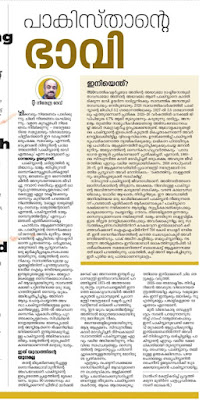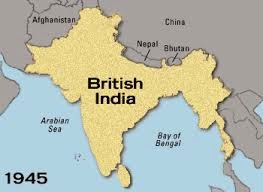Future of Pakistan
“Most follow the rules; some break the rules .... a few makes the rules”.
Narendra Modi may easily fit into this crisp and yet broad sense of the term.
But 'Operation Sindoor' has left another question of the decade:
"What's the Future of Pakistan ? "
The bitter truth is worse. For most of its history, Pakistan has been ruled by military dictators only and the people have simply surrendered before the mighty army over the years.
Pointers :
• Pakistan has only three major water storages at Tarbela, Mangla and Chashma, with a cumulative storage capacity of 14.10 MAF—only 9.7 per cent of its requirement.
• The disruption of water supplies will worsen almost threatening its food security.
The political class barring Nawaz Sharif from time to time and Imran Khan (after he was ousted) has readily crawled when asked to bend. There may be no dispute if one throws up a googlie-type statement -"In the rest of the globe -- the country owns the army or the military force but in Pakistan, it is the army that owns the country".
Post-Pahalgam; everyone is talking about Gen Asim Munir, Pakistani army chief and his lecture in April on the two-nation theory. The remarks were like a pre-emptive announcement. He wanted the trouble with 'India-waley' to come out of the present mess both for the military and the country's economy.
The army commanders wanted to ensure national unity via its war against India.
It is possible only with Pakistan that a war was/is being "enforced" on the financially starving economy by the army; yet no one questions the Fauzi establishment.
Pakistan's last military dictator was forced to quit in 2008. One must appreciate since then Pakistan has seen the longest spell of civilian control in its history.
But by the turn of 17 years -- that is in 2025 --- it virtually faces existential crisis.
May 6th-7th night gave it a nightmare reminding it of 1971 when Bangladesh was created out of East Pakistan.
Another bitter fact is -- not only the country is ‘owned’ by the army; everything seems to revolve in that country around India. This excessive obsession has today left it red-faced and isolated.
 |
| Blogger's piece in 'Matrubhumi', Kerala paper |
The root of the problem for the present imbroglio for Pakistan lies in over estimation of his personal smartness by the Pakistan's army chief Munir.
Field Marshal Manek Shaw had told the then Indian PM Indira Gandhi that a war is 90 per cent waiting. If such a strategy paid dividends in 1971; it is all the more vital in today's world.
PM Modi has himself asserted to Russian President Vladimir Putin -- "... this is not an era of war". So Modi moved in slowly and cautiously. Modi first hit the western neighbour with his new aggressive water policy.
The suspension of Indus Water Treaty (IWT) has actually hit Pakistan 'hardest' and in long term perspective. Modi's response to Pahalgam was being drawn based on analyses of ground situations and the preparations by the army.
A decisive war cannot be won just by emotions. Even as the public expectations are/were for quicker and harsher strategies and kinetic military actions; the wisest thing was going according to plans. This has left Pakistan shattered.
Modi's waiting strategy and punctuating it with non-kinetic measures - banning trade and travel - was actually "moving forward" in the long term perspective.
The enemy was left confused and even Islamabad was forced to slid backwards and even commit a few mistakes. The foreign policy engine room did not realise the geo-politics of 2025 -- where Modi and India have many friends and partners in the comity of nations.
Quad is one and so is India’s friendship with Russia despite the Ukraine war.
According to former foreign secretary Shyam Saran, --The Gulf states too have refused to open up their coffers for Islamabad. There is fatigue among the Gulf countries about having to repeatedly bail Pakistan out, and a sense that Islamabad has not given them much in return for doing so over the years.
Come to think of it even China is no longer giving Pakistan a 'confidence' it requires at this juncture.
Corruption and inefficiency aside vis-a-vis Beijing sponsored projects in Pakistan, China is also displeased at Islamabad's inability to deliver on security promises.
A number of Chinese engineers and project supervisors have been killed by Baloch terrorists. Although China remains Pakistan’s biggest patron, the two countries’ bilateral relationship is not what it used to be.
India’s Commerce Ministry may have to rework some of the trade issues with Beijing and this may be to the liking of the Xi Jinping regime because Donald Trump’s tariff war has created a new world order.
Pakistan's future involves economic growth or the lack of it. It is also about the political stability or its absence.
The nation faces challenges like high poverty rates and economic imbalances. Pakistan's GDP is potentially reaching 3.2% and 3.5% in FY26 and FY27, respectively. The fiscal deficit is expected to remain elevated at 6.7% of GDP in 2025-26.
Pakistan needs to address social issues like poverty and inequality to ensure inclusive growth.
It also never realised that Pakistan's engagement in global affairs, including its role in the South Asia region should have bee better.
When he rekindled the two-nation theory fire; Gen Munir and his military colleagues expected a 'conventional Indian response' on the lines of what happened after Uri and Pulwama. Munir was justifying the creation of Pakistan and also encouraged the Resistant Front or Lashqar fdayeens to carry out their Pahalgam operation.
But when the Modi government chose the non-kinetic route especially on Indus waters; Gen Munir, his sycophant PM Shehbaz Sharif and other leaders such as Bilawal Bhutto and Khwaja Asif were thrown off balance.
By holding the 1960 Indus Waters Treaty (IWT) in abeyance, Modi has given them the shock of their life. The Pakistani leaders in their madness had forgotten that no less India's Modi had declared on September 26, 2016, in the wake of the Uri attack, that blood and water can’t flow together.
The Indus Water Treaty had divided the six rivers of the Indus basin between the two countries. Pakistan received the three western rivers - the Indus, Jhelum, and Chenab. Three other rivers - the Ravi, Beas, and Sutlej in the eastern side came to India.
However, India can use these western rivers for “non-consumptive” purposes like irrigation, hydro-power and navigation. The Indus is Pakistan’s lifeline and hence the Govt of India decision was pure blow. The disruption of water supplies will worsen the already prevailing water scarcity.
Pakistan's agriculture will be harmed. The real impact will be felt in Pakistan during the dry season.
Who will dispute Pakistan continues to hurtle toward an uncertain future.
It’s problems are many. There is none to rescue or lead the nation taking corrective steps. Even the Supreme Court cannot do much. The country is led by an utterly unserious elite and military. Both these stakeholders cannot grasp the enormity of the challenges facing the country.
Islamabad is reeling from an economic crisis and having secured a $7 billion IMF bailout only last year. It will now face the prospect of costly military mobilisation.
Ends
Balochistan Game may begin:
In 2016, August 15th – Independence Day speech Narendra Modi had said - "The world is watching. People of Balochistan, Gilgit, Baltistan and occupied Kashmir have thanked me a lot in the past few days. I am grateful to them”.
He had said the way people from these Pakistani regions "wished me well, gives me great joy". In thanking an Indian Prime Minister, "they have thanked the whole population of my country ..... I want to offer my gratitude to these people."
Ends









No comments:
Post a Comment